How to Talk About Emotions in Italian: 92 Vocabulary Words
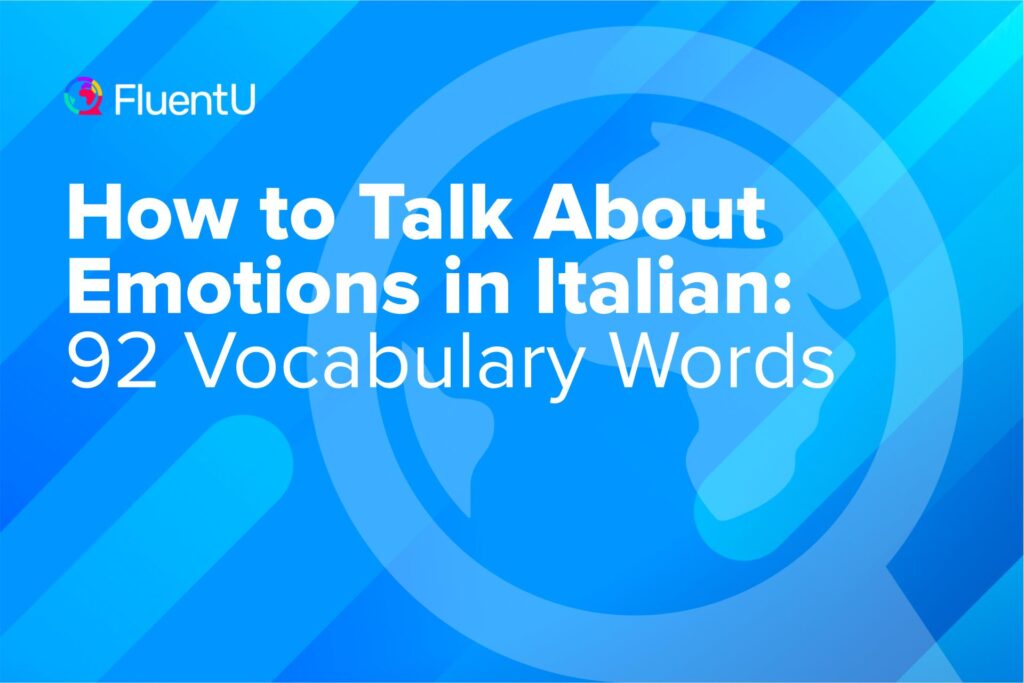
Le emozioni means “emotions” in Italian. Whether you’re happy, sad, excited, angry or somewhere in between, knowing how to describe your feelings in Italian will help you improve your conversation skills.
Learn how to talk about your emotions and feelings in Italian, along with tons of vocabulary words for any type of emotion you might be feeling.
Download: This blog post is available as a convenient and portable PDF that you can take anywhere. Click here to get a copy. (Download)
How to Talk About Emotions in Italian
Emotions as Adjectives
When you say that you’re feeling happy (or any other emotion), you’re using the emotion as an adjective. Emotions are often used as adjectives in Italian, too, but they require a few more steps.
Unlike in English, adjectives usually come after the noun they modify in a sentence. For example:
- Il libro interessante — The interesting book
You also need to keep in mind the gender and number of the noun being modified. The emotion needs to match whoever is feeling it. When modifying words for gender and number, consider the following:
- Gender: Adjectives often change based on the gender of the noun they modify. For example, contento changes into contenta for females.
- Number: Adjectives also change for singular and plural forms. Add -i for plural masculine and -e for plural feminine. For example, contento turns into contenti and contente.
Here are some more examples:
- La giornata tranquilla — The calm day
- Un giorno felice — A happy day
- L’uomo felice — The happy man
- È un momento triste. — It is a sad moment.
- L’uomo arrabbiato alza la voce. — The angry man raises his voice.
- La loro felicità era contagiosa, illuminando l’intera stanza. — Their happiness was contagious, brightening the entire room.
Emotions as Nouns
Emotions can also turn into nouns when they’re used as the main subject or object in a sentence.
You can also use an emotion as something that someone has, in which case you’d use possessive adjectives. For example:
- La tua felicità è contagiosa. — Your happiness is contagious.
Here are some more examples of emotion words acting as nouns in sentences:
- La paura di fallire. — The fear of failure.
- Hai provato tristezza. — You felt sadness.
- L’entusiasmo riempiva l’aria quando è stato fatto l’annuncio. — Excitement filled the air as the announcement was made.
- Lei provava un grande orgoglio per il suo lavoro. — She had great pride in her work.
- Nulla supera la gioia che provo quando ti vedo. — Nothing beats the joy I feel when I see you.
Key Vocabulary and Phrases
You’re just about ready to name your emotions in Italian. But first, let’s check out some more general words and phrases related to feelings:
| Italian | English |
|---|---|
| Le emozioni | Emotions |
| I sentimenti | Feelings |
| L'umore | Mood |
| La sensazione | Sensation |
| Il temperamento | Temperament |
| Il portamento | Demeanor |
| L'atteggiamento | Attitude |
| Lo stato d'animo | State of mind |
| Come ti senti? | How do you feel? |
| Stai bene? | Are you feeling okay? |
| Come va? | How are you doing? / What's up? |
| Sto bene. | I'm fine |
Emotion Vocabulary in Italian
Let’s get into some specific feelings in Italian! You’re sure to find the right word for the specific emotion you’re experiencing below. Click on any word or example sentence to hear it spoken. You can also find many more examples and vocabulary words on the video-based FluentU language learning program.
FluentU takes authentic videos—like music videos, movie trailers, news and inspiring talks—and turns them into personalized language learning lessons.
You can try FluentU for free for 2 weeks. Check out the website or download the iOS app or Android app.
P.S. Click here to take advantage of our current sale! (Expires at the end of this month.)
How to Say “Happy” in Italian
| Italian | English |
|---|---|
| Felice | Happy |
| Felicissimo | Delighted |
| Gioioso | Joyful |
| Soddisfatto | Pleased |
| Compiaciuto | Pleased |
| Entusiasta | Elated |
| Allegra | Cheerful |
| Giubilante | Jubilant |
| Beato | Blissful |
| Estasiato | Ecstatic |
| Euforico | Euphoric |
Examples:
- Mi sento felice ogni volta che parliamo. — I feel happy every time we talk.
- Era felice di ricevere il regalo inaspettato. — He was delighted to receive the unexpected gift.
- Erano soddisfatti del feedback positivo sul loro progetto. — They were pleased with the positive feedback on their project.
- I fiori colorati nel giardino creavano un’atmosfera allegra. — The colorful flowers in the garden created a cheerful atmosphere.
How to Say “Sad” in Italian
| Italian | English |
|---|---|
| Triste | Sad |
| Afflitto | Sorrowful |
| Melanconico | Gloomy |
| Addolorato | Mournful |
| Abbattuto | Despondent |
| Cupo | Gloomy |
| Turbato | Upset |
| Deluso | Disappointed |
| Depresso | Depressed |
| Infelice | Unhappy |
| Pensieroso | Pensive |
Examples:
- Il cielo nuvoloso rende l’atmosfera malinconica. — The cloudy sky makes the atmosphere melancholy.
- Questa tragica notizia ci ha resi tutti un po’ tristi. — This tragic news has made us all a bit sad.
- Dopo l’incidente, si è sentito turbato e impotente. — After the accident, he felt upset and powerless.
- Si sentì delusa quando i suoi piani andarono in fumo. — She was disappointed when her plans fell through.
How to Say “Excited” in Italian
| Italian | English |
|---|---|
| Ispirato | Inspired |
| Entusiasta | Enthusiastic |
| Desideroso | Eager |
| Emozionato | Thrilled |
| Animato | Animated |
| Estasiato | Ecstatic |
| Carico | Pumped |
| Eccitato | Fired up |
| Appassionato | Impassioned |
Examples:
- L’allenamento intenso l’ha lasciata carica di energia positiva. — The intense workout left her pumped with positive energy.
- Sono davvero desideroso di iniziare il corso a cui mi sono appena iscritto. — I’m really eager to start the course I just enrolled in.
- Il panorama mozzafiato l’ha ispirata a iniziare a dipingere. — The breathtaking scenery inspired her to start painting.
- L’animata discussione ha portato idee diverse sul tavolo. — The animated discussion brought diverse ideas to the table.
How to Say “Angry” in Italian
| Italian | English |
|---|---|
| Arrabbiato | Angry |
| Brontolone | Grumpy |
| Infastidito | Annoyed |
| Irritato | Irritated |
| Turbato | Upset |
| Furioso | Furious |
| Infuriato | Enraged |
| Agitato | Agitated |
| Indignato | Outraged |
Examples:
- Dopo la notte insonne, si svegliò brontolone e stanco. — After the sleepless night, he woke up grumpy and tired.
- L’incidente inaspettato lo ha reso particolarmente irritato. — The unexpected accident made him particularly irritated.
- Il cliente era furioso per il pessimo servizio. — The customer was furious about the poor service.
How to Say “Peaceful” in Italian
| Italian | English |
|---|---|
| Pacifico | Peaceful |
| Tranquillo | Calm / Tranquil |
| Sereno | Serene |
| Calmo | Calm |
| Silenzioso | Quiet |
| Sereno | Untroubled |
| Rilassato | Relaxed |
| Riposante | Restful |
Examples:
- La vista del mare al tramonto è così tranquilla. — The view of the sea at sunset is so calm.
- Respirare profondamente lo ha aiutato a rimanere calmo durante la stressante riunione. — Taking deep breaths helped him stay calm during the stressful meeting.
- La biblioteca era così silenziosa che si poteva sentire una spilla cadere. — The library was so quiet that you could hear a pin drop.
- Nonostante le sfide, è rimasto sereno e concentrato. — Despite the challenges, he remained untroubled and focused.
How to Say “Afraid” in Italian
| Italian | English |
|---|---|
| Spaventato | Afraid |
| Impaurito | Scared |
| Nervoso | Nervous |
| Timoroso | Fearful |
| Terrorizzato | Terrified |
| Ansioso | Anxious |
| Apprensivo | Apprehensive |
| Pietrificato | Petrified |
| Allarmato | Alarmed |
| Preoccupato | Worried |
| Inquieto | Uneasy |
| Intimidito | Intimidated |
Examples:
- L’escursionista si sentiva timoroso nella densa nebbia. — The hiker felt fearful in the dense fog.
- Il nuovo dipendente si sentì intimidito dai superiori. — The new employee felt intimidated by the senior staff.
- Era ansiosa per l’esame imminente. — She was anxious about the upcoming exam.
- Il forte botto ha allarmato l’intero quartiere. — The loud bang alarmed the entire neighborhood.
Other Emotions in Italian
Positive Emotions
| Italian | English |
|---|---|
| Grato | Grateful |
| Interessato | Interested |
| Divertito | Amused |
| Speranzoso | Hopeful |
| Affettuoso | Loving |
| Orgoglioso | Proud |
| Empatico | Empathetic |
| Compassionevole | Compassionate |
| Sicuro | Confident |
| Affidabile | Trusting |
| Tollerante | Tolerant |
Negative Emotions
| Italian | English |
|---|---|
| Disgustato | Disgusted |
| Sprezzante | Contemptuous |
| Colpevole | Guilty |
| Vergognoso | Shameful |
| Invidioso | Jealous |
| Frustrato | Frustrated |
| Deluso | Disappointed |
| Risentito | Resentful |
| Solitario | Lonely |
| Disperato | Despairing |
| Sfavorevole | Disapproving |
Neutral Emotions
| Italian | English |
|---|---|
| Sorpreso | Surprised |
| Annoiato | Bored |
| Indifferente | Indifferent |
| Curioso | Curious |
| Confuso | Confused |
| Apatico | Apathetic |
| Nostalgico | Nostalgic |
| Inquieto | Restless |
| Incerto | Uncertain |
| Perplesso | Perplexed |
No matter how you’re feeling, now you can describe your emotions and feelings in Italian.
And One More Thing...
If you're as busy as most of us, you don't always have time for lengthy language lessons. The solution? FluentU!
Learn Italian with funny commericals, documentary excerpts and web series, as you can see here:
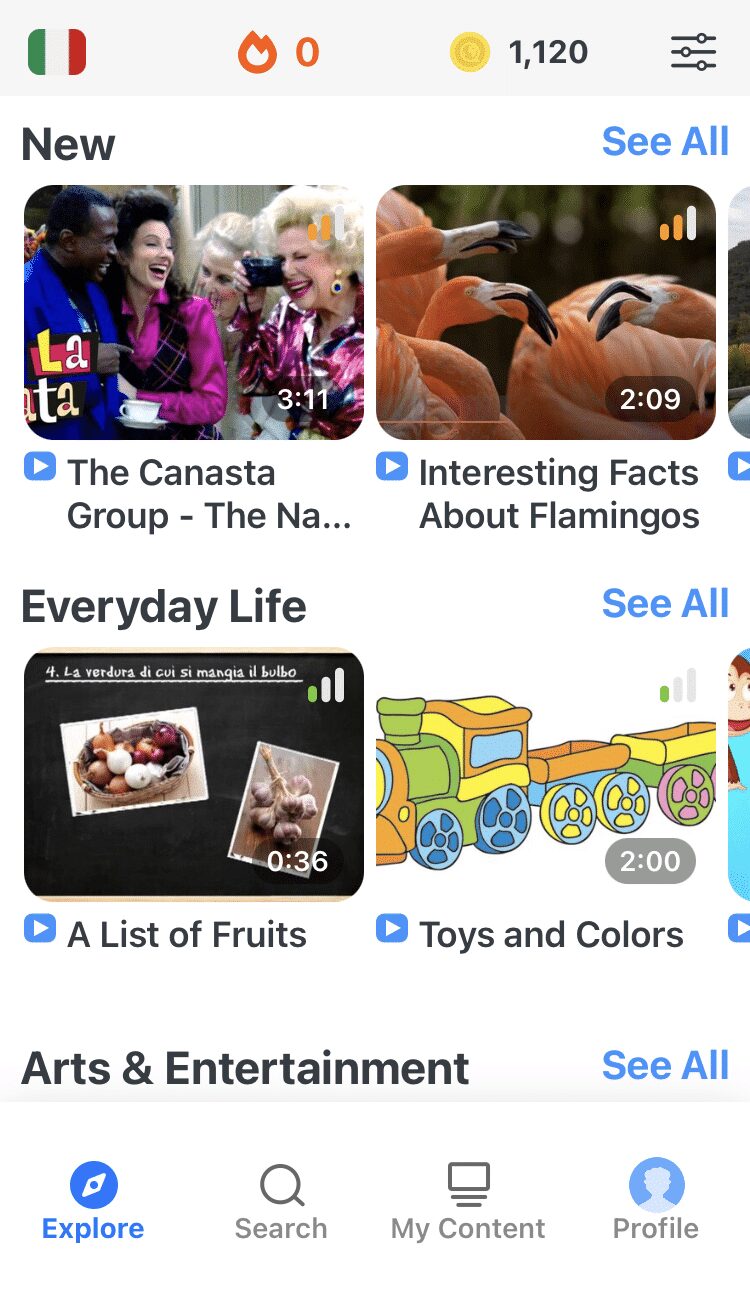
FluentU helps you get comfortable with everyday Italian by combining all the benefits of complete immersion and native-level conversations with interactive subtitles. Tap on any word to instantly see an image, in-context definition, example sentences and other videos in which the word is used.
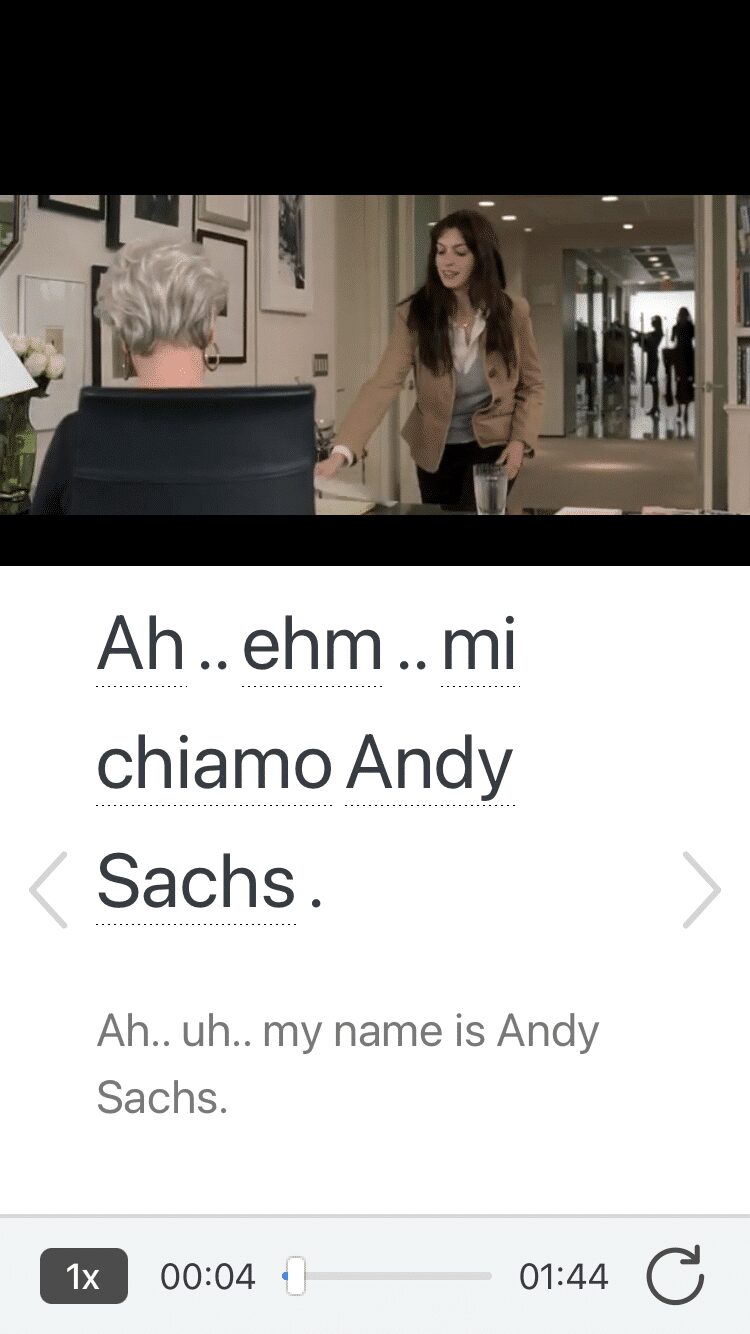
Access a complete interactive transcript of every video under the Dialogue tab, and review words and phrases with convenient audio clips under Vocab.
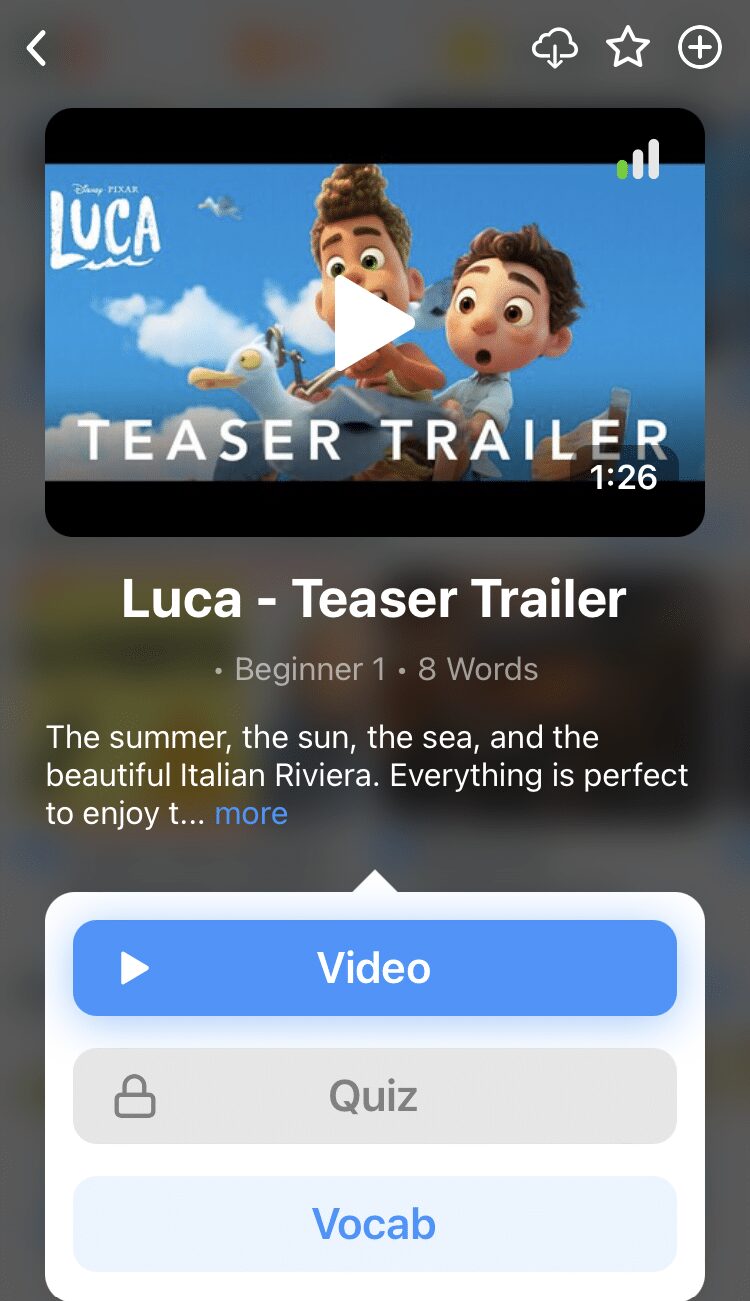
Once you've watched a video, you can use FluentU's quizzes to actively practice all the vocabulary in that video. Swipe left or right to see more examples of the word you’re on.
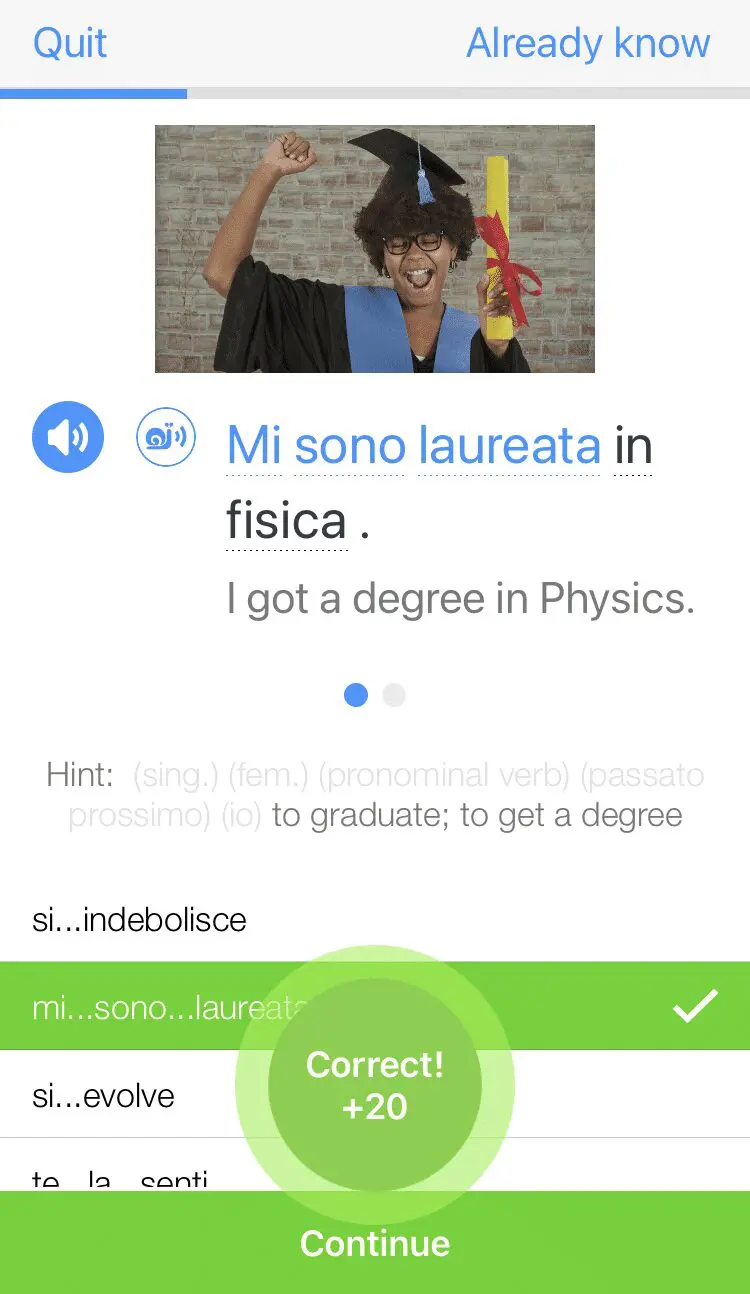
FluentU will even keep track of all the Italian words you’re learning, and give you extra practice with difficult words. Plus, it'll tell you exactly when it's time for review. Now that's a 100% personalized experience!
The best part? You can try FluentU for free with a trial.
Start using the FluentU website on your computer or tablet or, better yet, download the FluentU app from the iTunes or Google Play store. Click here to take advantage of our current sale! (Expires at the end of this month.)








